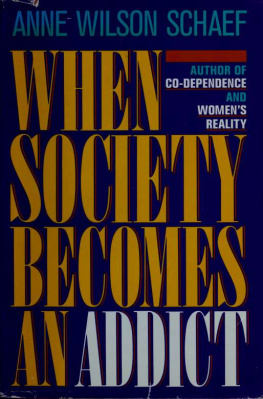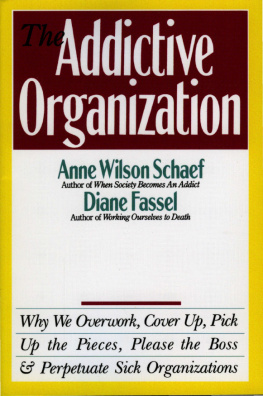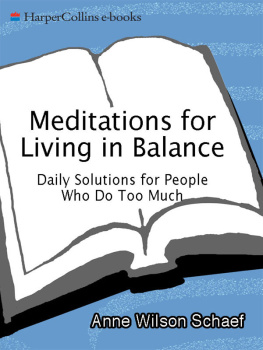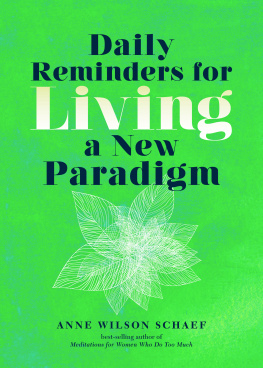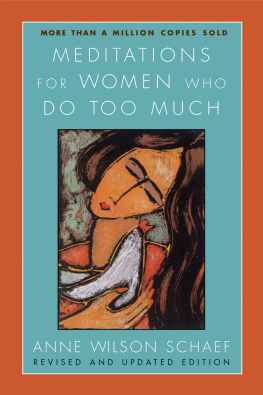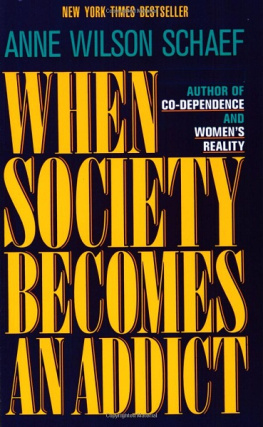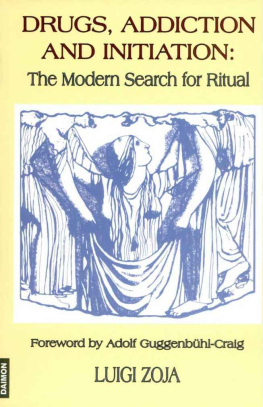Anne Wilson Schaef - When Society Becomes an Addict
Here you can read online Anne Wilson Schaef - When Society Becomes an Addict full text of the book (entire story) in english for free. Download pdf and epub, get meaning, cover and reviews about this ebook. year: 2013, publisher: HarperOne, genre: Politics. Description of the work, (preface) as well as reviews are available. Best literature library LitArk.com created for fans of good reading and offers a wide selection of genres:
Romance novel
Science fiction
Adventure
Detective
Science
History
Home and family
Prose
Art
Politics
Computer
Non-fiction
Religion
Business
Children
Humor
Choose a favorite category and find really read worthwhile books. Enjoy immersion in the world of imagination, feel the emotions of the characters or learn something new for yourself, make an fascinating discovery.
- Book:When Society Becomes an Addict
- Author:
- Publisher:HarperOne
- Genre:
- Year:2013
- Rating:4 / 5
- Favourites:Add to favourites
- Your mark:
- 80
- 1
- 2
- 3
- 4
- 5
When Society Becomes an Addict: summary, description and annotation
We offer to read an annotation, description, summary or preface (depends on what the author of the book "When Society Becomes an Addict" wrote himself). If you haven't found the necessary information about the book — write in the comments, we will try to find it.
When Society Becomes an Addict — read online for free the complete book (whole text) full work
Below is the text of the book, divided by pages. System saving the place of the last page read, allows you to conveniently read the book "When Society Becomes an Addict" online for free, without having to search again every time where you left off. Put a bookmark, and you can go to the page where you finished reading at any time.
Font size:
Interval:
Bookmark:

This book made available by the Internet Archive.





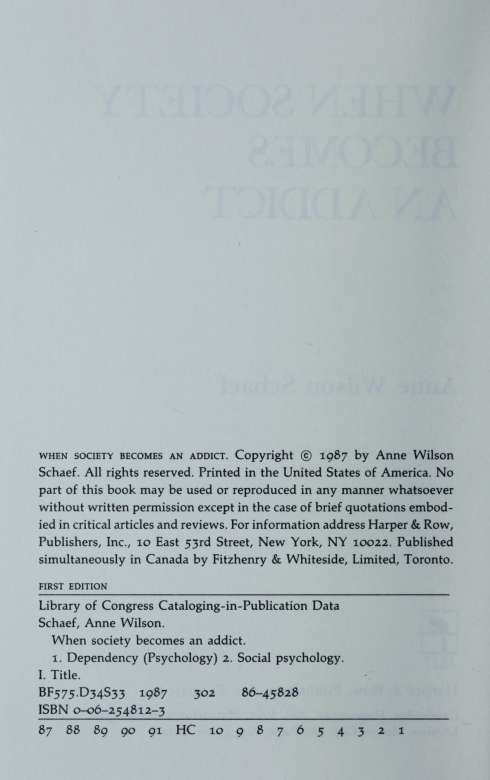
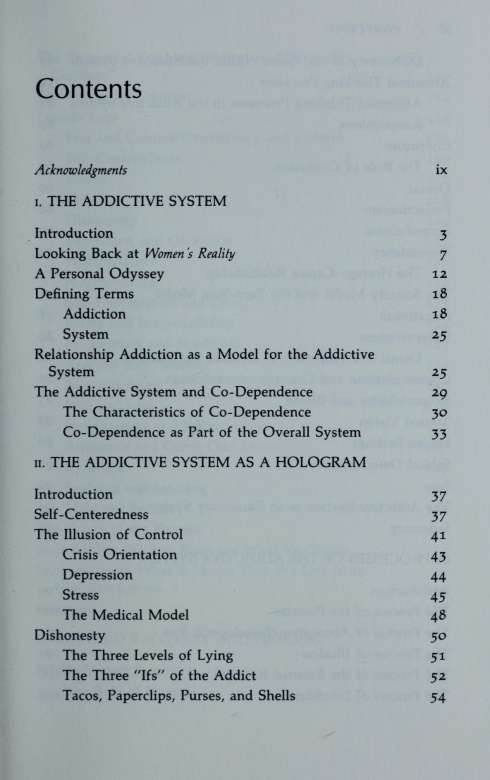
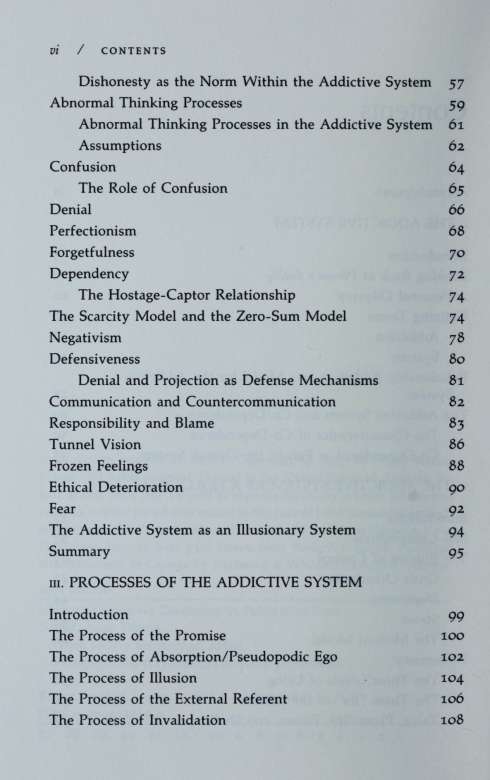
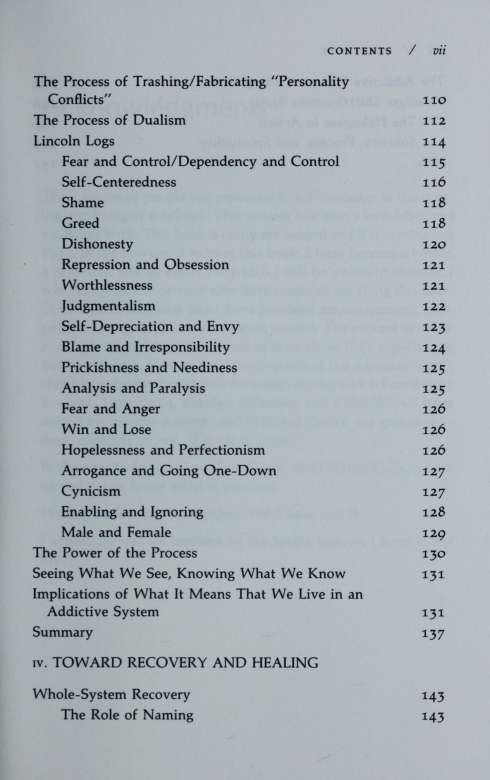
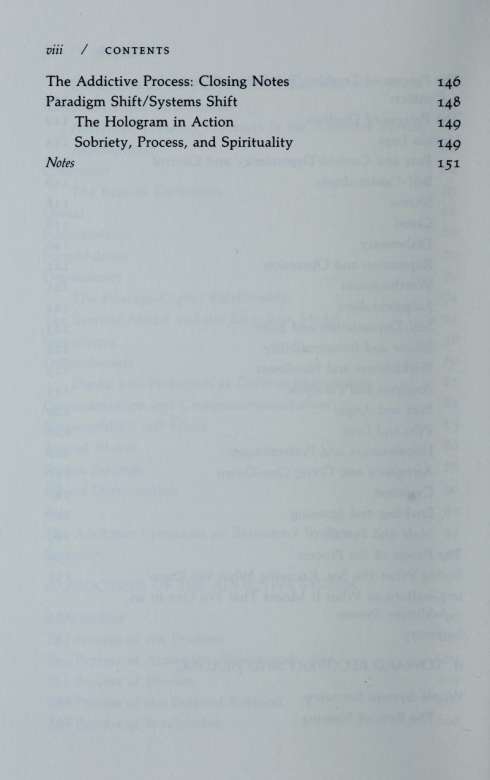
Acknowledgments
There are many people and processes to acknowledge in the coming into being of this book. This process has been a long labor and a difficult birth. This book is really my second and it is coming out third. In the process of writing this book, 1 have become a writer, a re-writer, and an editor for which 1 will be eternally grateful. I want to thank the persons who have nurtured me along this path. Diane Fassel and John Reed have provided encouragement, support, and tough criticism when most needed. The process network and the trainees have given freely of their ideas, their experiences, and themselves. They and the participants at the intensive workshops have freely shared their lives with me for which 1 am deeply honored. Ugis Pinka, Carolyn Schrodes, and Carol Barrett have helped me become a writer, and Beth and Roddy, my grown children, continue to say, ''Go for it. Mom.''
Professionally Jan Johnson, Tom Grady, and Clayton Carlson have helped me to know what is possible.
Writing books requires support and I have had it.
I appreciate and am touched by the loving support I have in my life.
WHEN SOCIETY BECOMES AN ADDICT
I. THE ADDICTIVE SYSTEM
Throughout the book, I have changed identifying details and created composites for illustrative purposes.
INTRODUCTION
Our society is deteriorating at an alarming rate. As we watch the news and read the newspapers, we are increasingly made aware of corruption in high places, financial collapse, and a lack of morality in settings ranging from preschools to meat packing plants. We fear that our children will be stolen by child pornography rings, and we hear of our ''healers'' taking sexual advantage of their clients. Our planet is being destroyed by acid rain and pollution, and nuclear holocaust is a very real possibility. Hunger and wars rage over the planet.
As a society, we are responding not with action but with a widespread malaise. The market for antidepressants has never been better. Apathy and depression have become synonymous with adjustment. Rather than looking for ways to change, to save ourselves, we are becoming more conservative, more complacent, more defensive of the status quo.
Those few individuals who notice and draw attention to these growing problems are met with massive denial. When they run for public office, they are not elected. When they confront us with what they know, they are ignored, dismissed, or discredited.
Other persons attempt to analyze and combat these problems by writing about them. Recent years have seen a proliferation of books expressing their concern from every field of study: Why Democracies Perish, The Reenchantment of the World, The One Straw Revolution, Turning Point, Entropy, Megatrends, and Green Paradise Lost are just a few.^
How-to books on subjects ranging from weight control to psychological self-help are more popular than ever. All try to give us answers, and none really addresses the problem.
I believe that there are two reasons this is true. First, most, if not all, stop at analysis and go no further. The thinking behind them
4 / WHEN SOCIETY BECOMES AN ADDICT
is almost exclusively ''left-brain"rational and logical. To paraphrase Morris Berman in The Reenchantment of the World, they come out of a nonparticipatory, scientific approach that is based upon empiricism and logical positivism. This approach is quite limited; it views the world through a very narrow set of lenses.
Second, most, if not all, deal with only one piece of the problem. No one as yet has put the pieces together and treated the problem as a whole. In fact, I suspect that no one has yet perceived the problem as a wholeor, at least, seen it for what it is.
Much of what we know about our society can be compared to what the blind persons knew about the elephant. As that old story teaches us, an elephant is more than just ears, a tail, or a trunk; it is more, even, than just an animal. It is also a process within a context. It is born, it lives, and it dies. This is a process.
The context of our elephantour societyis the fact that the system in which we live is an addictive system. It has all the characteristics and exhibits all the processes of the individual alcoholic or addict. It functions in precisely the same ways. To say the society is an addictive system is not to condemn the society, just as an intervention with an alcoholic does not condemn the alcoholic. In fact, those of us who work with addicts know that the most caring thing to do is not to embrace the denial and to confront the disease. This is the only possibility the addict has to recover. Just as with the addict, one has to say that the society has a disease. It is not itself the disease. If it admits having the disease, it has the option of recovery.
This awareness that society has an addictive disease is what is missing from other explanations of treatments of the problems we are facing today. Most other concerned writers focus only on their specific area of interest or expertise. This is the norm within a fragmented society such as ours. It is also characteristic of the tunnel vision of the alcoholic/addict.
In addition, most people who look at the system are too close to it and too involved in it to see it clearly. They are frequently themselves functioning addicts (in ways I will go on to make clear), come from addictive, dysfunctional families, or they have
THE ADDICTIVE SYSTEM / 5
tried to step outside the system and be ''objective/' which only serves to keep them uninformed and nonparticipating.
In order to perceive the Addictive System for what it is, one must be in it but not of it. In other words, one must be recovering from its effects. There are people who fit this criterion. Historically, however, the main curing agent for addictions has been anonymousAlcoholics Anonymous, Al-Anon, Overeaters Anonymous, Gamblers Anonymous, and so on. As a result, the people who have the most accurate perceptions of our system have often hidden this knowledge in anonymity.
It is impossible to come to a real understanding of anything without actively participating in it. My work in the women's movement and the chemical dependency field has taught me that the most reliable information is that which comes from people with personal experience. Objectivity is a myth. The people who can be trusted the most are those who can honestly say, "I know how you feel because I have been there myself."
Font size:
Interval:
Bookmark:
Similar books «When Society Becomes an Addict»
Look at similar books to When Society Becomes an Addict. We have selected literature similar in name and meaning in the hope of providing readers with more options to find new, interesting, not yet read works.
Discussion, reviews of the book When Society Becomes an Addict and just readers' own opinions. Leave your comments, write what you think about the work, its meaning or the main characters. Specify what exactly you liked and what you didn't like, and why you think so.

